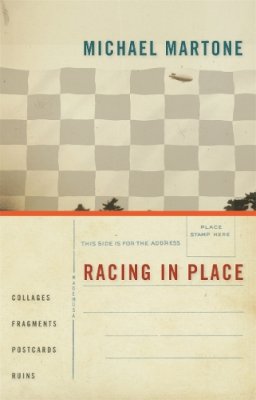9%OFF

Stock image for illustration purposes only - book cover, edition or condition may vary.
Racing in Place: Collages, Fragments, Postcards, Ruins
Michael Martone
€ 24.99
€ 22.64
FREE Delivery in Ireland
Description for Racing in Place: Collages, Fragments, Postcards, Ruins
Paperback. Describes how the author's mother, as the dean of girls at a high school in Fort Wayne, Indiana, "constructed a nostalgic past out of nothing." Num Pages: 184 pages. BIC Classification: DNF. Category: (G) General (US: Trade). Dimension: 216 x 140 x 13. Weight in Grams: 259.
Is it truth or fiction? Memoir or essay? Narrative or associative? To a writer like Michael Martone, questions like these are high praise. Martone’s studied disregard of form and his unruffled embrace of the prospect that nothing—no story, no life—is ever quite finished have yielded some of today’s most splendidly unconventional writing. Add to that an utter weakness for pop Americana and what Louise Erdrich has called a “deep affection for the ordinary,” and you have one of the few writers who could pull off something like Racing in Place. Up the steps of the Washington Monument, down the home ... Read more
Show LessProduct Details
Format
Paperback
Publication date
2008
Publisher
University of Georgia Press
Condition
New
Number of Pages
184
Place of Publication
Georgia, United States
ISBN
9780820330396
SKU
V9780820330396
Shipping Time
Usually ships in 15 to 20 working days
Ref
99-9
About Michael Martone
MICHAEL MARTONE is a professor of English at the University of Alabama. He is the author of several books, including The Flatness and Other Landscapes, Unconventions: Attempting the Art of Craft and the Craft of Art, and Racing in Place (all Georgia). His stories and essays have appeared in Harper’s, Esquire, Story, Antaeus, North American Review, Benzene, Epoch, Denver Quarterly, ... Read more
Reviews for Racing in Place: Collages, Fragments, Postcards, Ruins
Martone's gentle, thoughtful, and wry tone informs these pitch-perfect segmented essays on growing up and moving on, on the mythic Midwest, the subtropical South, and the gloomy sunless Northeast. His concerns in this collection are about the act of creative 'transformation' whether the creative act is personal or aimed at an audience. The ordinary always transforms into the extraordinary in ... Read more
